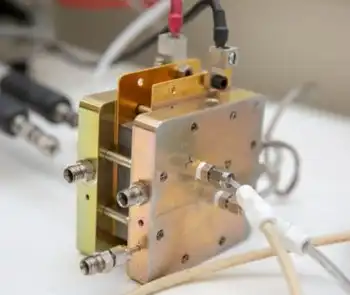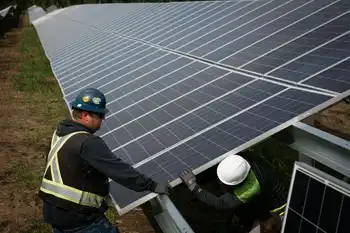Canadian Government Invests in Fuel-Cell Technology
TORONTO -- -
TORONTO -- Clean, efficient hydrogen fuel cells could soon be powering multi-dwelling and small commercial buildings, thanks to a more than $2 million contribution from the Government of Canada. Senator Jerry Grafstein announced today that funding from Natural Resources Canada (NRCan) and the Climate Change Action Fund will help Hydrogenics Corporation develop and test a 50 kilowatt prototype electric generator that uses fuel-cell technology fueled by natural gas. "I congratulate Hydrogenics for its leading-edge work in advanced fuel-cell technologies to supply electricity and heat to buildings," said Senator Grafstein. "This innovative technology will tap into an emerging market for fuel-cell technologies in the building sector." "I'm excited by the potential of the fuel cell," said NRCan Minister Ralph Goodale. "Clean, efficient and reliable, it has the potential not only to reduce greenhouse gas emissions here at home, but also to provide new opportunities for Canadian firms to help the rest of the world deal with climate change." Fuel cells convert energy into electricity through an electrochemical process. The system being developed by Hydrogenics, known as the Fuel Cell Energy Tap, generates electricity by using proton exchange membrane (PEM) fuel-cell technology fueled by natural gas. Each generator is capable of providing electrical power, as well as space and water heating, to approximately six to seven units in a building. Fuel-cell technology is one of the most promising energy options for reducing carbon dioxide emissions - a key greenhouse gas. Fuel cells produce clean energy, operate at low temperatures and are highly efficient and very reliable. The system could reduce emissions of carbon dioxide - a key greenhouse gas - by 1 megatonne over 12 years. The total project cost is $6,000,000. The Government of Canada is contributing $2 million - $1,600,000 from the technology early action measures (TEAM) component of the Climate Change Action Fund, and $400,000 from Natural Resources Canada. Hydrogenics Corporation is contributing $4,000,000 through private financing. "It means a great deal to Hydrogenics that the Government of Canada supports our efforts," said Pierre Rivard, President and CEO. "We are pleased that there is a shared vision of clean and efficient energy through fuel cell technology. Hydrogenics is proud to be a leader in the development of leading-edge energy solutions." "Today's investment will also attract talented people to this emerging industry," said Sarkis Assadourian (MP - Brampton Centre). "Once commercially available this project could create 1,000 new jobs over the next decade, jobs that will create a climate that can lead to more innovation." Hydrogenics was formed in 1995 by a team of research engineers educated through the University of Toronto's Fuel Cell Research Program to develop fuel-cell technologies and apply them to buildings and other energy conscious markets. Government of Canada funding for this agreement was provided for in the $150-million Climate Change Action Fund (CCAF) established by the Government of Canada in the 1998-99 federal budget and is therefore built into the existing fiscal framework. The Action Fund was extended for a further three years in the 2000 federal budget. For more information on TEAM and other Climate Change Action Fund projects please visit www.climatechange.gc.ca.
Related News

New fuel cell concept brings biological design to better electricity generation
MADISON - Fuel cells have long been viewed as a promising power source. But most fuel cells are too expensive, inefficient, or both. In a new approach, inspired by biology, a team has designed a fuel cell using cheaper materials and an organic compound that shuttles electrons and protons.
Fuel cells have long been viewed as a promising power source. These devices, invented in the 1830s, generate electricity directly from chemicals, such as hydrogen and oxygen, and produce only water vapor as emissions. But most fuel cells are too expensive, inefficient, or both.
In a new approach, inspired by biology and published…




